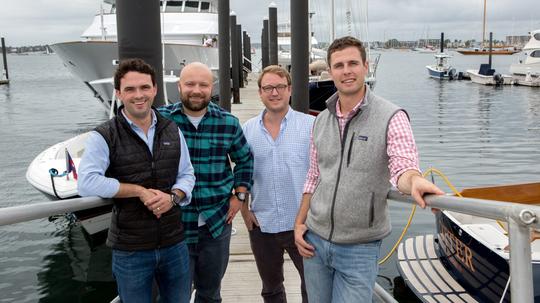
When Dockwa co-founder and CEO Mike Melillo first launched the company in 2014, one of the first things he and his other co-founders agreed on was to let everyone work remotely, no matter where they lived.
The concept was foreign to Melillo at the time, but co-founder and CTO John Nagro assured him that a remote policy would enable the company to recruit and compete for talent all over the country, leveling the playing field against larger software companies that could pay more.
Fast forward six years later. Dockwa, a platform that allows boaters to book and get quotes for dockage and storage at 1,100 marinas nationwide, now had two physical offices—one in Newport, Rhode Island, and one in Cambridge, Massachusetts. The remote policy was still in place.
As soon as the coronavirus began to spread, the company went fully remote, with both offices closed beginning March 4. The Dockwa team never stopped working. The company retained all of its employees and has found opportunities to grow even as the virus sent the economy into a tailspin.
“The team did an awesome job in large part because we had practiced for it. We had centralized all of our communications and planning in order to support a third of our workforce, which works remotely to begin with,” Melillo told Rhode Island Inno. “This wasn’t a new muscle to us, and I think that was a big advantage to us early on.”
It has not been all smooth sailing, of course.
About one-third of Dockwa’s customers are hotels and resorts with marinas, and they were hit hard, according to Melillo, who said clients in warmer states like Florida that had been in the midst of their busy season went from 95 or 100 percent occupancy to zero overnight.
But the abrupt decline in business also forced marina owners to think about how they could conduct business using the smallest number of people possible, which in turn forced them to reevaluate their technical offerings.
“They did not have as many people in the office because folks got furloughed, so they had to really lean into leveraging technology to run a lot of the day-to-day activities they previously employed folks for,” said Melillo. “By no means are we a replacement [for humans]. We always say, ‘We will never catch dock lines.’ But there is a lot of stuff technology has enabled so owners can keep cash flow coming through the door and hire people back.”
Dockwa also saw new opportunities with an uptick in boating—an activity that is almost universally compatible with social distancing protocols.
“We have never seen this amount of boating activity, this high, on a daily basis,” said Melillo, adding that inbound leads grew 400 percent on a year-over-year basis.
In the California and Florida markets, Melillo said the number of daily boat trips and fuel consumption levels went through the roof. Bookings in New England are right in line or slightly ahead from this same time period last year, and daily boat rentals are way up, he said.
People who normally travel overseas with their boats have also had to find new ways to spend their money.
Melillo said the company has seen higher-than-ever bookings from mega yachts, vessels over 130 feet, in New England and other parts of the U.S.
He also said Dockwa has also seen its boat storage marketplace explode.
When the virus hit cities like Boston and New York hard, people fled to their summer homes early and, as a result, found themselves in need of longer storage periods for their boats on a seasonal and annual basis.
Melillo said Dockwa built many of its offerings, such as contactless payments and the storage marketplace, before coronavirus, but many users had not been willing to adopt the technology.
“I think this has been a catalyst for a lot of operations—call it an excuse,” he said. “Historically, they may have been reluctant to change systems or operations to look at ways they could manage their day-to-day more effectively and efficiently, but now, they were forced to without as many resources around them.”
With the company’s remote setup a success, Melillo said he is not sure Dockwa will ever return to an office, or that it might get rid of its Cambridge office and just have one central location employees can go to for meetings.
“From an overhead perspective, it will be a nice [cost] savings for us if we don’t have to support a physical office in two locations in the future, and I think the team has proven that we don’t need to,” he said. “If I can utilize those proceeds for additional engineers, sales, or marketing, that goes a heck of a lot farther.”








